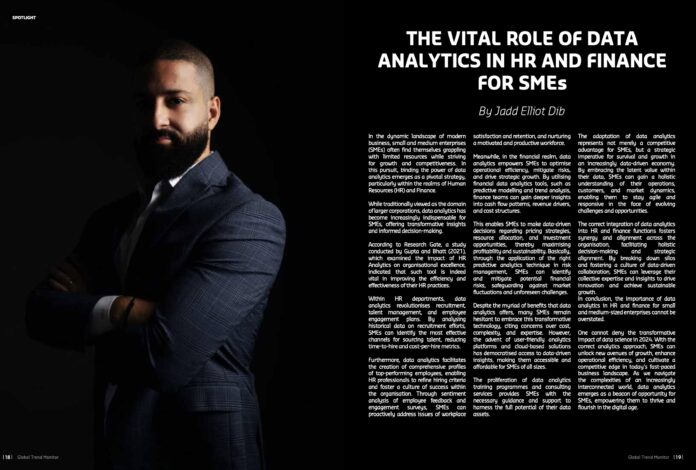By: Jadd Elliot Dib
In the dynamic landscape of modern business, small and medium enterprises (SMEs) often find themselves grappling with limited resources while striving for growth and competitiveness. In this pursuit, binding the power of data analytics emerges as a pivotal strategy, particularly within the realms of Human Resources (HR) and Finance. While traditionally viewed as the domain of larger corporations, data analytics has become increasingly indispensable for SMEs, offering transformative insights and informed decision-making.
According to Research Gate, a study conducted by Gupta and Bhatt (2021), which examined the impact of HR Analytics on organisational excellence, indicated that such tool is indeed vital in improving the efficiency and effectiveness of their HR practices.
Within HR departments, data analytics revolutionises recruitment, talent management, and employee engagement plans. By analysing historical data on recruitment efforts, SMEs can identify the most effective channels for sourcing talent, reducing time-to-hire and cost-per-hire metrics.
Furthermore, data analytics facilitates the creation of comprehensive profiles of top-performing employees, enabling HR professionals to refine hiring criteria and foster a culture of success within the organisation. Through sentiment analysis of employee feedback and engagement surveys, SMEs can proactively address issues of workplace satisfaction and retention, and nurturing a motivated and productive workforce.
Meanwhile, in the financial realm, data analytics empowers SMEs to optimise operational efficiency, mitigate risks, and drive strategic growth. By utilising financial data analytics tools, such as predictive modelling and trend analysis, finance teams can gain deeper insights into cash flow patterns, revenue drivers, and cost structures.
This enables SMEs to make data-driven decisions regarding pricing strategies, resource allocation, and investment opportunities, thereby maximising profitability and sustainability. Basically, through the application of the right predictive analytics technique in risk management, SMEs can identify and mitigate potential financial risks, safeguarding against market fluctuations and unforeseen challenges.
Despite the myriad of benefits that data analytics offers, many SMEs remain hesitant to embrace this transformative technology, citing concerns over cost, complexity, and expertise. However, the advent of user-friendly analytics platforms and cloud-based solutions has democratised access to data-driven insights, making them accessible and affordable for SMEs of all sizes. The proliferation of data analytics training programmes and consulting services provides SMEs with the necessary guidance and support to harness the full potential of their data assets.
The adaptation of data analytics represents not merely a competitive advantage for SMEs, but a strategic imperative for survival and growth in an increasingly data-driven economy. By embracing the latent value within their data, SMEs can gain a holistic understanding of their operations, customers, and market dynamics, enabling them to stay agile and responsive in the face of evolving challenges and opportunities.
The correct integration of data analytics into HR and finance functions fosters synergy and alignment across the organisation, facilitating holistic decision-making and strategic alignment. By breaking down silos and fostering a culture of data-driven collaboration, SMEs can leverage their collective expertise and insights to drive innovation and achieve sustainable growth.
In conclusion, the importance of data analytics in HR and finance for small and medium-sized enterprises cannot be overstated.
One cannot deny the transformative impact of data science in 2024. With the correct analytics approach, SMEs can unlock new avenues of growth, enhance operational efficiency, and cultivate a competitive edge in today’s fast-paced business landscape. As we navigate the complexities of an increasingly interconnected world, data analytics emerges as a beacon of opportunity for SMEs, empowering them to thrive and flourish in the digital age.
